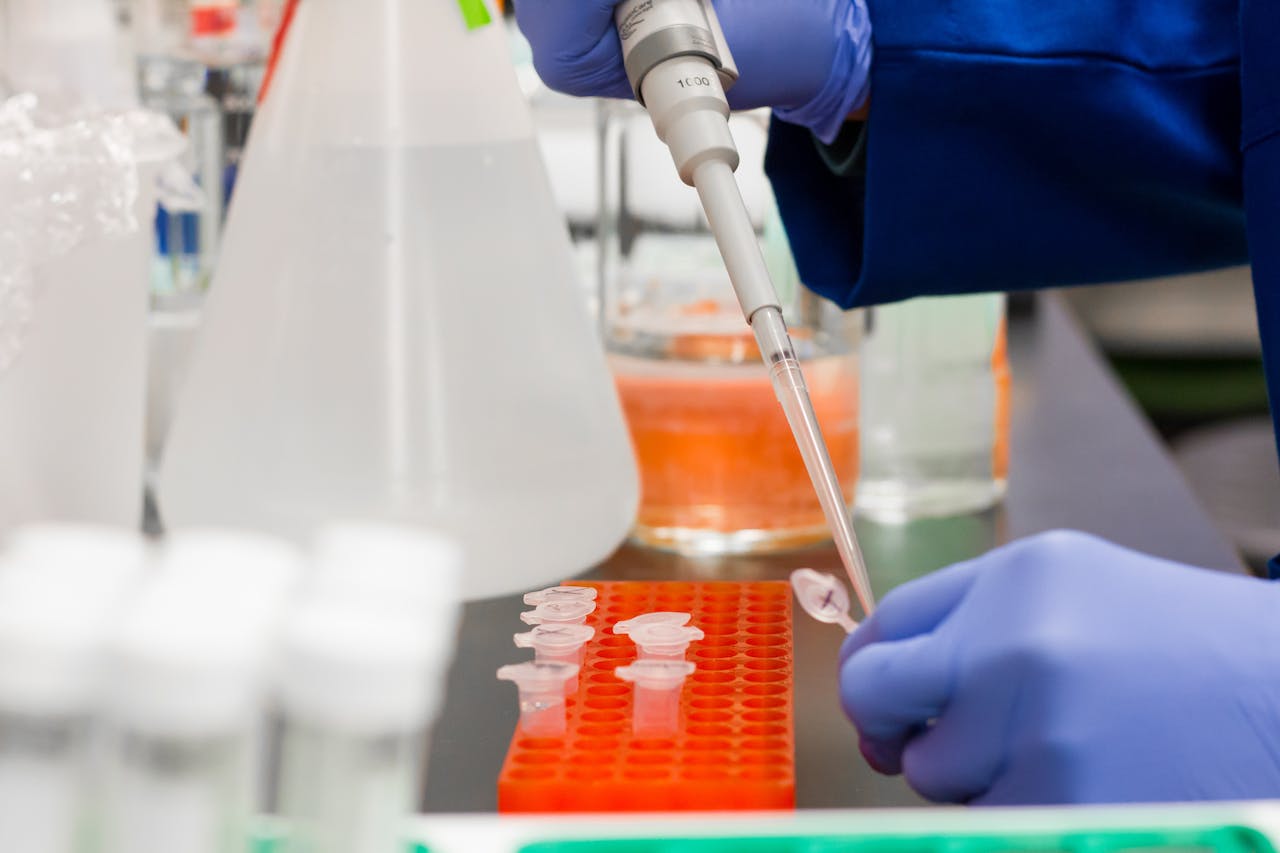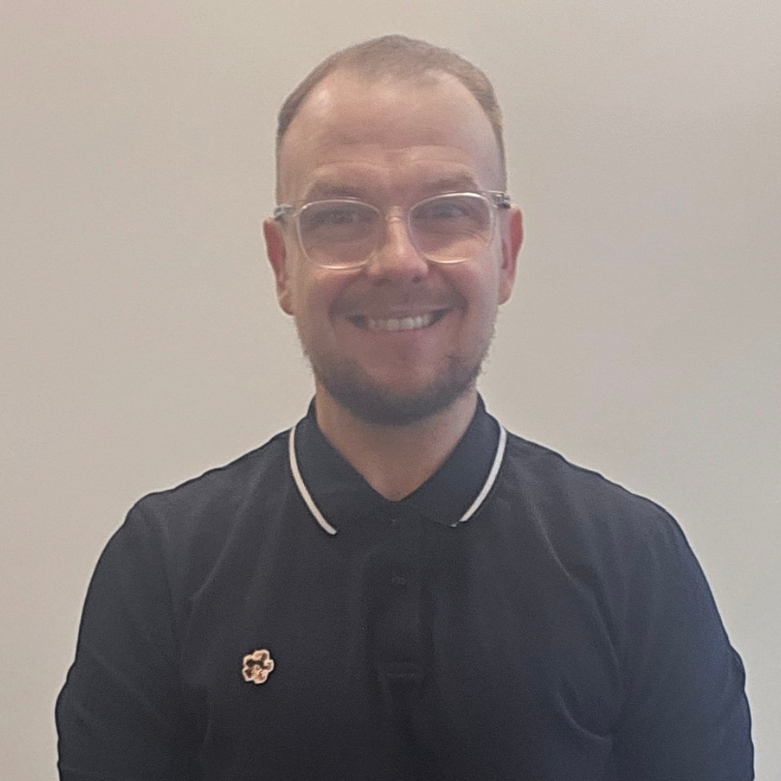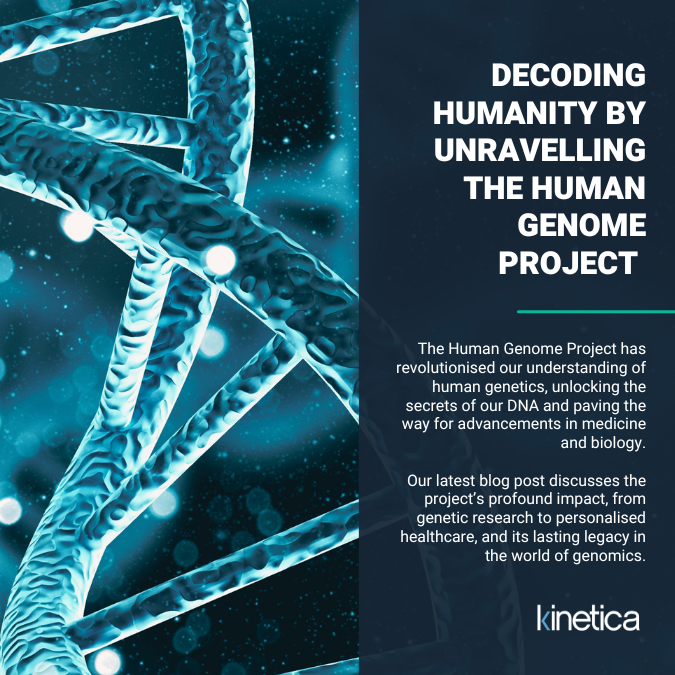INSIGHTS
The latest insights & news from Kinetica
Exploring the Key Genomics Jobs Shaping the Future of Healthcare
05 Dec, 20237 minThose interested in pursuing genomics jobs are setting themselves up for a career in a secto...

Those interested in pursuing genomics jobs are setting themselves up for a career in a sector that has the potential to revolutionise healthcare worldwide. As a specialist in genomics recruitment, we are in regular discussions with businesses worldwide who are constantly looking for talent to fill roles in this exciting and innovative sector.
In order to spark interest in careers in this fascinating sector, we have provided an insightful guide where we'll discuss exactly what genomics is, the impact it is having, and the key genomics jobs that are driving innovation and progress.
Before getting stuck into the vital genomics jobs, let's ask what precisely is genomics, and how does it hold the power to reshape healthcare as we understand it?
What is Genomics?
Genomics is the study of genetic or epigenetic sequence information of organisms. It aims to understand the function and structure of these sequences and downstream biological products. Genomics in healthcare explores the intricate relationship between molecular mechanisms, how they interact with health interventions, and the influence of environmental factors on disease. It makes it possible to predict, diagnose, and treat diseases more personally and precisely than ever before.
What are the differences between genetics and genomics?
Genetics primarily focuses on the study of heredity, examining individual genes and their characteristics. In contrast, genomics is a broader discipline that encompasses the analysis of all genes, their functions, and their intricate relationships. It aims to decipher how these genes collectively influence an organism's growth and development. In essence, genetics zooms in on the specifics of single genes, while genomics takes a holistic approach by exploring the interactions and combined effects of all genes.
How is Genomics Reducing Global Health Inequality?
Human genomics research and biotechnologies have the potential to achieve several crucial public health goals, including reducing worldwide health inequalities by providing developing countries with cost-effective, efficient, and robust means of diagnosing, preventing, and treating diseases that affect their population.
Genomics offers the long-term possibility of providing new approaches to the management and prevention of several intractable diseases. Therefore, it is vital to prepare society for the complexities of this new and rapidly evolving field to ensure that its benefits are fairly distributed to people globally and that more conventional and well-tried approaches to medical practice and research are not neglected while the potential of genomics continues to be explored.
Next, we will explore the genomics jobs crucial to the sector's future and driving its impact in healthcare.
Genomic Clinical Scientists
Clinical scientists working in genomics are responsible for examining samples of a patient's DNA to identify genomic and genetic abnormalities that may cause acquired or inherited diseases.
As a clinical scientist specialising in genomics, you will play a crucial part in the healthcare team. Your main task involves choosing the most suitable scientific tests for patient samples. These tests are essential for guiding clinicians in determining the best course of action for both the patient and their family.
Collaboration is a crucial element of your work. You'll closely work with various healthcare professionals, including genetic technologists. They handle the samples, extracting DNA and conducting the necessary tests to produce results. Additionally, you may collaborate with clinical bioinformaticians, who organise and present the test data in a user-friendly format.
After receiving the test results, your role shifts to analysing and interpreting them. This step is vital for identifying gene alterations and assessing the risk to other family members or future generations. The insights derived from your analysis are then shared with clinicians. This information is invaluable for patient diagnosis, the development of appropriate treatment plans, and an improved understanding of the prognosis. Your contribution as a clinical scientist in genomics greatly influences patient care and the assessment of genetic risks.
Roles and Responsibilities
Your responsibilities as a genomic clinical scientist include:
- Create and develop new investigation strategies. These strategies would consider the clinical problems of genetic disease and the clinical relevance of acquitted or inherited genetic abnormalities.
- The request for non-routine and routine specialised tests of tissue samples and blood that genetic technologists undertake.
- Using your clinical, scientific, and clinical knowledge to examine and interpret the results of these tests.
- Carry out continued professional development (CPD)
- Deal with enquiries related to genomic testing and provide their scientific expertise to clinical colleagues and various healthcare professionals.
- Developing interpretive reports for clinicians, including paediatricians, neurologists, and general practice doctors, who have requested tests.
If your position is more senior-level, then extra responsibilities would include:
- Leading training sessions and the monitoring and supervision training of clinical scientists.
- The recruitment and selection of new employees.
- Carrying out of appraisals
- Lead research programmes and activities
Required Qualifications and Skills
To begin a career as a genomic clinical scientist, you will need the following qualifications and training:
- The NHS Scientist Training Programme (STP) provides the training to become a clinical scientist. This is a full-time, three-year training and work-based programme that also includes a Masters level academic study.
- In order to apply for the programme, you will need a first or a 2:1 undergraduate degree or an integrated Master's degree in genomics.
- If you don't have a degree in genomics, the programme will also accept a qualification in a related subject with a genetics component, for example, human biology, microbiology, cellular sciences, or biochemistry.
- If you have a 2:2 degree in genomics or a related subject, you can still apply if you have a higher degree in a relevant subject.
As well as the relevant qualifications and training, you will have an extensive array of soft skills, including:
- Excellent problem-solving skills
- An investigative and analytical mindset
- Attention to detail
- Strong self-awareness
- Self-motivation and resilience
- Teamworking skills
- Exceptional organisational and time management skills
- Excellent verbal and written communication skills
Career Development
After becoming qualified, you can advance through the ranks by gaining experience, undergoing further training, and engaging in research. Advancements are based on your performance, and you may need to consider relocating to different hospitals to seize available opportunities.
As you progress in your career, you'll likely take on supervisory roles with responsibilities for your department's work. Becoming a consultant requires additional training. Climbing the ladder to deputy head or department head often involves managing a substantial department or a significant section of a department. Achieving a senior position is possible by making substantial contributions to the field of genetics.
You also have the option to explore clinical research opportunities, either in collaboration with a university or a research institute or by participating in training and registration assessments.
Additionally, you can further your career by becoming involved with professional organisations, taking on external professional roles, or transitioning into advisory positions through organisations such as the National Institute for Health and Care Excellence (NICE) or the Department of Health and Social Care.
Genetic Counsellors
Next on our list of genomics jobs are genetic counsellors. Genetic councillors are responsible for assessing genomic risk, communicating genomic information, and supporting people and their families through genomic testing and diagnosis.
You'll work as part of a multidisciplinary team alongside clinical scientists and geneticists, supporting diagnosing, managing, predicting, and screening for genetic disease. You'll achieve this by:
- Analysing family history details
- Examining the risks of passing on or inheriting medical conditions
- Ordering and interpreting genomic and genetic test results.
- Explaining these test results to the patients and their relatives
They work as part of a multidisciplinary team that includes scientists, medics, and bioinformaticians to provide this support and care during an emotionally difficult time. They are responsible for representing patients in meetings and communicating decisions and results clearly and understandably so that the patients can consider the options available to them.
Roles and Responsibilities
Take a look at the main responsibilities of genetic counsellors:
- Examining a family tree and interpreting the risk of passing on inheriting a genetic condition.
- Assessment of genomic and genetic tests is the most suitable, and proceeding to order this.
- Communicating with patients to offer support, provide results, or answer questions considering linguistic, ethical, and cultural factors.
- Conducting and documenting patient consultations.
- The translation of genetic and genomic test results into lay language for non-genetic health professionals, patients, and their families.
- Taking part in genomic, genetic, clinical, and psychosocial research.
- Teaching genomic counselling to fellow health professionals.
Required Qualifications and Skills
What about the skills and qualifications needed to be a genetic counsellor? Let's have a look at some of them:
- To begin a career as a genetic counsellor, you will need to hold a degree in genetics, nursing, or biological/biomedical science. Other degrees, such as psychology and social sciences, may also be considered.
- Ideal candidates would also have experience in areas such as counselling, healthcare volunteer work, or patient advocacy.
- Training to become a genetic counsellor will involve earning a Master's degree from a program recognised by the Accreditation Council for Genetic Counselling (ACGS). The programs are usually 2 years and include coursework in areas such as human genetics, bioethics, and research methodology, clinical experience in diverse genetic specialities, and independent study projects.
Once you have completed your degree, you can demonstrate that you have met the standards required to provide genetic counselling to a high and required standard.
As well as the necessary qualifications and training, you will be required to demonstrate the following skills:
- Organisation and planning to manage caseloads of patients
- Research skills
- Ability to work as part of a team and autonomously
- Able to interpret complex scientific papers and genetic test results
- Interpersonal skills so you can empathise with patients and communicate sensitive information
- Numeracy and IT skills
- Writing and reporting skills
Career Development
The usual career path in this profession is usually as follows:
- Pre-registration genetic counsellor
- Genetic counsellor
- Principal/lead genetic counsellor
- Consultant genetic counsellor
Principal genetic counsellors are experts with substantial training and experience beyond that of a genetic counsellor. Those at the consultant level take a lead role locally and nationally in their field of expertise.
Another avenue you can explore is becoming a committee or board member of a professional body, such as AGNC or ABMGG. There are also career paths in education, research, policy, service management, and professional regulation.
Field Application Specialists
A Field Application Specialist serves as the crucial link between companies that manufacture and sell advanced genomics products and the laboratory scientists that will purchase them to utilise in research. Their responsibilities include training and onboarding of the new technology, ensuring exceptional service delivery to customers.
They also provide technical support, troubleshoot issues, and optimise genomics technologies. This role extends to advising customers on experimental and assay design, conducting pre-sales presentations, product demonstrations, and technical seminars. Additionally, these specialists assist laboratory teams in instrument installation and the development of scientific applications.
Roles and Responsibilities
Typical duties of a field application specialist include:
- Serve as the primary technical point of contact for customers, offering expert guidance and support during the implementation and utilisation of genomics lab equipment and technology.
- Collaborate closely with the sales team, identifying customer needs, providing pre-sales support, and contributing to the development of customised solutions.
- Conduct product demonstrations, training sessions, and workshops to educate customers on equipment protocols, data analysis, and best practices.
- Collect customer feedback and collaborate with the R&D team to drive product improvements and enhancements.
- Stay up-to-date with the latest advancements in genomics and related technologies, sharing knowledge with customers and internal teams.
- Represent the company at scientific conferences, workshops, and other events, delivering presentations and engaging with the scientific community.
- Troubleshoot technical issues and provide timely and effective solutions to ensure customer satisfaction.
Required Qualifications and Skills
A key requirement for a career as a Field Application Specialist in genomics is a degree in a relevant field, including molecular biology or biochemistry. This educational background sets the stage for the intricate work involved in this role, providing candidates with the necessary theoretical foundation.
In addition to academic qualifications, a prospective specialist should possess a strong background and expertise utilising genomics technology. This practical knowledge is crucial for navigating the complexities of the role and ensuring a comprehensive understanding of the field. While prior experience in a customer-facing role, such as technical support or a field application scientist, is highly desirable, it's not mandatory.
On top of these crucial qualifications, field application specialists also require the following skills to excel in their roles.
- Strong written and verbal communication skills to be able to convey complex scientific concepts to diverse audiences
- Presentation skills
- Problem-solving and troubleshooting issues independently
- Ability to build relationships with stakeholders and customers
- Collaboration and teamwork
Career Development
The journey of a Field Application Specialist in genomics frequently involves a shift from academia to the industry, creating pathways for continuous learning and professional development. This role often acts as a gateway to diverse career avenues within the scientific industry, such as product management, sales, and marketing.
As professionals advance in their careers, they may assume higher responsibilities, including leadership roles or product management positions. The role also provides chances for continual learning, allowing individuals to stay abreast of the latest advancements in the field. This dynamic career path offers a spectrum of opportunities for growth and evolution within the scientific realm.
Business Development Manager
A Business Development Manager in genomics plays a pivotal role in propelling sales and fostering business growth through the sale of genomics technology. The position involves a multifaceted approach, from pinpointing key customers, understanding their needs, and promoting the genomics technology to seal the deal. Collaboration across medical, technical, and business teams is integral, demanding a rapid grasp of new information, adept presentation skills, and the ability to thrive in a dynamic environment.
Beyond sales, the role may include crafting marketing materials and actively participating in diverse marketing initiatives. Success in this role opens doors to leadership positions, allowing for progression to higher levels of management within the organisation. A profound grasp of genomics and the application of innovative technologies to real-world situations is fundamental for excelling in this position.
Roles and Responsibilities
The roles and responsibilities of a clinical bioinformatician include:
- Identify and target potential customers and key decision-makers in the genomics equipment market.
- Build and maintain strong relationships with existing and new customers to drive sales and meet revenue targets.
- Conduct market research to identify emerging trends, customer needs, and the competitive landscape.
- Develop and execute business development strategies to expand the company's presence.
- Collaborate with cross-functional teams, including marketing, product development, and operations, to ensure successful product launches and customer satisfaction.
- Attend industry conferences, trade shows, and networking events to promote the company's products and services.
- Prepare and deliver persuasive sales presentations and proposals to potential clients.
- Negotiate and close business deals, ensuring favourable terms and conditions for the company.
- Monitor and analyse sales performance metrics to identify areas for improvement and implement corrective actions.
Qualifications and Skills
A qualified candidate is expected to hold a bachelor's degree in the Life Science field, with the added advantage of a master’s or PhD. This educational foundation provides a solid framework for understanding the intricate dynamics of the genomics equipment industry. However, it's not just about academic qualifications; a proven track record of success in business development is crucial. The ideal candidate will have similar experience, ideally within the genomics equipment industry or a closely related field, demonstrating a keen ability to drive business growth and establish meaningful connections.
A successful candidate in this role boasts a robust genomics equipment market knowledge base. This extends beyond a superficial understanding to a nuanced comprehension of key players, market trends, and, most importantly, customer needs.
On top of these vital qualification and experience, you will need to demonstrate the following skills:
- Communication for interacting with potential clients and stakeholders
- Negotiation and closing skills
- Ability to work independently
- Ability to develop and executive business plans
- Proactive and results-oriented mindset
Career Development
As Business Development Managers within the genomics industry demonstrate success, they often find opportunities for leadership roles, potentially advancing to the Director level within the organisation. This progression may involve specialisation in specific business verticals, allowing for a more focused exploration of areas within the genomics field.
Additionally, the role may include global engagement, with travel to meet researchers in biology, medicine, and biotechnology, providing networking opportunities and broadening industry connections. Importantly, the position of Business Development Manager can serve as a career transition, with individuals moving from academic research to industry roles and then progressing to leadership positions, showcasing the varied pathways available within the genomics industry.
Final Thoughts on Key Genomic Jobs
In our exploration into genomics jobs, we've embarked on a journey through the intricate world of genomics, understanding what it is and its profound impact on healthcare and its future. Genomics, as we've learned, is not just a field of study; it's a dynamic force driving precision medicine, disease prevention, and personalised healthcare to new heights.
As we've explored the critical roles played by professionals in the genomics sector, from Genomic Clinical Scientists to Genetic Counselors, Business Development Managers, and Field Application Specialists, it's evident that these individuals are at the forefront of a healthcare revolution. Their work directly impacts patient care, providing diagnoses, insights, and treatment plans that are increasingly precise and tailored to individual needs.
Whether you're drawn to the precise science of clinical testing, the strategic thinking of data analysis, or the compassionate role of supporting patients and their families, a career in genomics offers a multitude of opportunities to make a lasting impact on global health. The journey in genomics is ongoing, and the opportunities for growth, innovation, and positive change are boundless, making it an inspiring and rewarding field to explore and embrace.
Experts in Connecting Innovative Talent to Genomic Jobs
Our mission is to help businesses unlock their full potential, enabling them to make a significant impact on their industry and society at large. We achieve this by providing top-tier genomics recruitment solutions that connect forward-thinking organisations with exceptional talent in genomics, driving the innovation required to become industry leaders.
Whether you are a business looking for your next hire or a candidate looking for the latest genomics jobs, contact the team today and find out how we can support you.



